BlackRock CEO Larry Fink's pay cut by 30% for 2022
From CNN's Bryan Mena
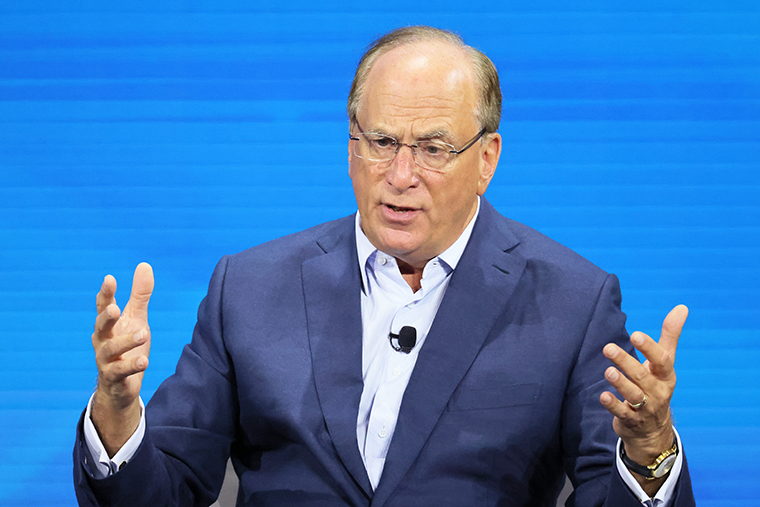 BlackRock CEO Larry Fink speaks during the New York Times DealBook Summit on November 30, 2022 in New York City. (Michael M. Santiago/Getty Images)
BlackRock CEO Larry Fink speaks during the New York Times DealBook Summit on November 30, 2022 in New York City. (Michael M. Santiago/Getty Images)BlackRock, the world's largest asset management firm, slashed Chief Executive Officer Larry Fink's pay by 30% to $25.2 million for 2022, according to a filing with the Securities and Exchange Commission.
The move comes after the money manager reported first-quarter revenue that was down 10% from a year ago, as rising interest rates and economic uncertainty impacted the firm's bottom line.
"With respect to 2022 compensation, management determined to reduce the impact of the firm’s decline in profitability on BlackRock’s broader employee population by concentrating the downward adjustments to total incentive awards toward senior management," the filing said.
Total compensation for Fink, 70, included a base salary of $1.5 million and $23.7 million in total incentive awards. Several other executives saw their compensation reduced, including Rob Kapito, the firm's president, whose package shrank by 34% to $18.95 million.
Fed approves UBS's acquisition of Credit Suisse's US subsidiaries
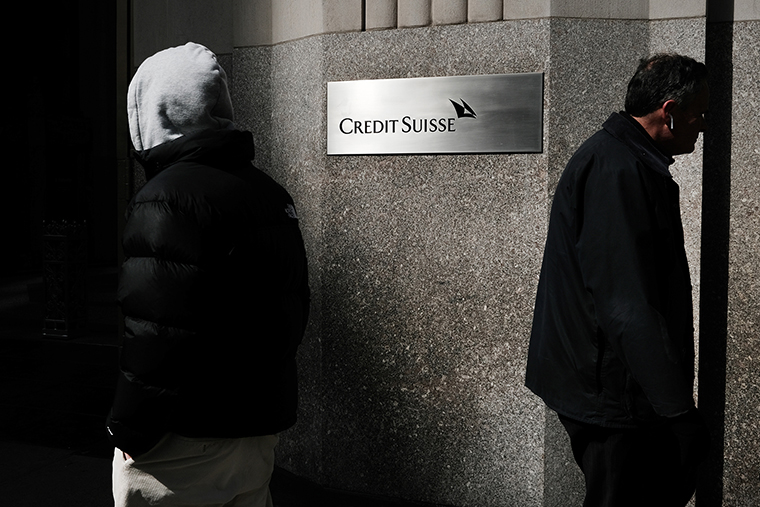 People walk by the New York headquarters of Credit Suisse on March 15 in New York City. (Spencer Platt/Getty Images)
People walk by the New York headquarters of Credit Suisse on March 15 in New York City. (Spencer Platt/Getty Images)UBS' purchase of Credit Suisse's US subsidiaries can move forward, the Federal Reserve said Friday.
The statement comes a month after UBS stepped in to rescue the embattled Swiss lender and prevent turmoil in the financial sector from spreading, after an emergency loan of nearly $54 billion from the Swiss National Bank failed to stop the carnage.
The problems for Credit Suisse began when the Saudi National Bank, its largest backer, said it wouldn't put up more cash after buying a nearly 10% stake in the bank for $1.5 billion in 2022.
Banking customers were already on edge after the collapses of Silicon Valley Bank and Signature Bank — so Credit Suisse shares tumbled more than 25% and saw billions of dollars of outflows.
The global turmoil has led US lawmakers to call for tighter regulations on banks. The Fed board said UBS will provide a quarterly updated plan for combining UBS's and Credit Suisse's US business and operations.
"The implementation plan will address UBS's obligations to comply with more stringent enhanced prudential standards, including liquidity standards," the Fed said in a statement.
UBS is shelling out 3 billion Swiss francs, or $3.25 billion, for Credit Suisse.
Stocks fall as strong bank earnings raise fears that the Fed will raise rates higher than expected
Stocks slid Friday after a slate of earnings beats from big banks fueled concerns that the Federal Reserve will raise interest rates at its next two meetings.
Still, the major indices gained for the week. The Dow rose 400 points, or 1.2%. The S&P 500 gained 0.8% and the Nasdaq Composite advanced 0.3%.
JPMorgan Chase on Friday reported first-quarter profit and revenue that crushed expectations, boosted by the Fed's interest rate hiking campaign. Citigroup, Wells Fargo and PNC Financial also reported strong results.
CEO Jamie Dimon warned investors in the company's post-earnings conference call that they should prepare for interest rates to be higher for longer than expected.
Wall Street seems to have taken note. Analysts increased their bets on a quarter-point rate hike at the Fed's meeting in May and another in June.
Federal Reserve Governor Christopher Waller said Friday that the central bank needs to continue tightening monetary policy, further weighing down markets.
Austan Goolsbee, president of the Federal Reserve Bank of Chicago, said that it's "definitely" possible the United States enters a mild recession after the tumult in banking last month.
Meanwhile, retail sales data declined more than expected, suggesting that Americans' spending power and the US economy are weakening.
Consumer sentiment held fairly steady in April, even as concerns about a recession linger, according to the University of Michigan's latest monthly survey.
"There was too much news to digest this morning, but the key takeaway is that the Fed has room to do more harm," Edward Moya, senior market analyst at OANDA, said in a note.
The Dow slipped 144 points, or 0.4%.
The S&P 500 tumbled 0.2%.
The Nasdaq Composite sank 0.4%.
As stocks settle after the trading day, levels might still change slightly.
Fed's Goolsbee: Global, US conditions indicate mild recession "on the table"
By CNN's Alicia Wallace
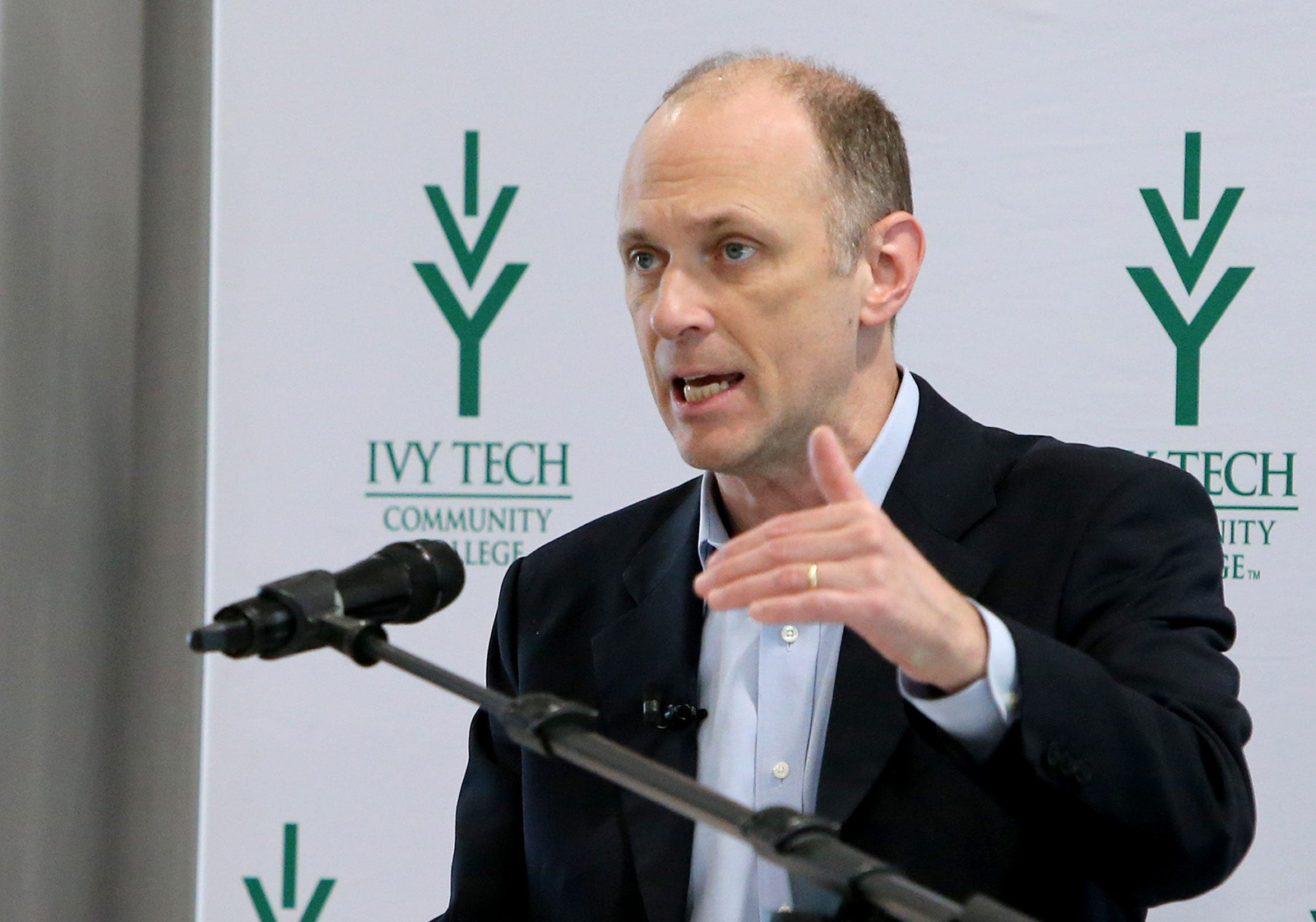 Austan Goolsbee speaks at Ivy Tech Community College in Indiana, on February 28. (Greg Swiercz/USA Today Network)
Austan Goolsbee speaks at Ivy Tech Community College in Indiana, on February 28. (Greg Swiercz/USA Today Network)Austan Goolsbee, president of the Federal Reserve Bank of Chicago, said Friday he isn't discounting the recent assessment from central bank economists that the banking crisis will tip the United States into a mild recession later this year.
"There's no way you can look at current conditions around the world and in the US and not think that some mild recession is definitely on the table as a possibility," Goolsbee said Friday during an interview on CNBC's "Squawk Box."
He added that, when viewed historically, the monetary tightening campaign undertaken by the Fed — hiking interest rates nine times in just over a year — is expected to slow GDP growth.
"When you get numbers like retail sales and others that are declining, if you look at construction, I think we've got to think about what's the state of growth in the country," he said. "Fortunately, the labor market continues to be very strong."
World Bank president: Life is hard for Russians even if data doesn't reflect that
From CNN's Rob North
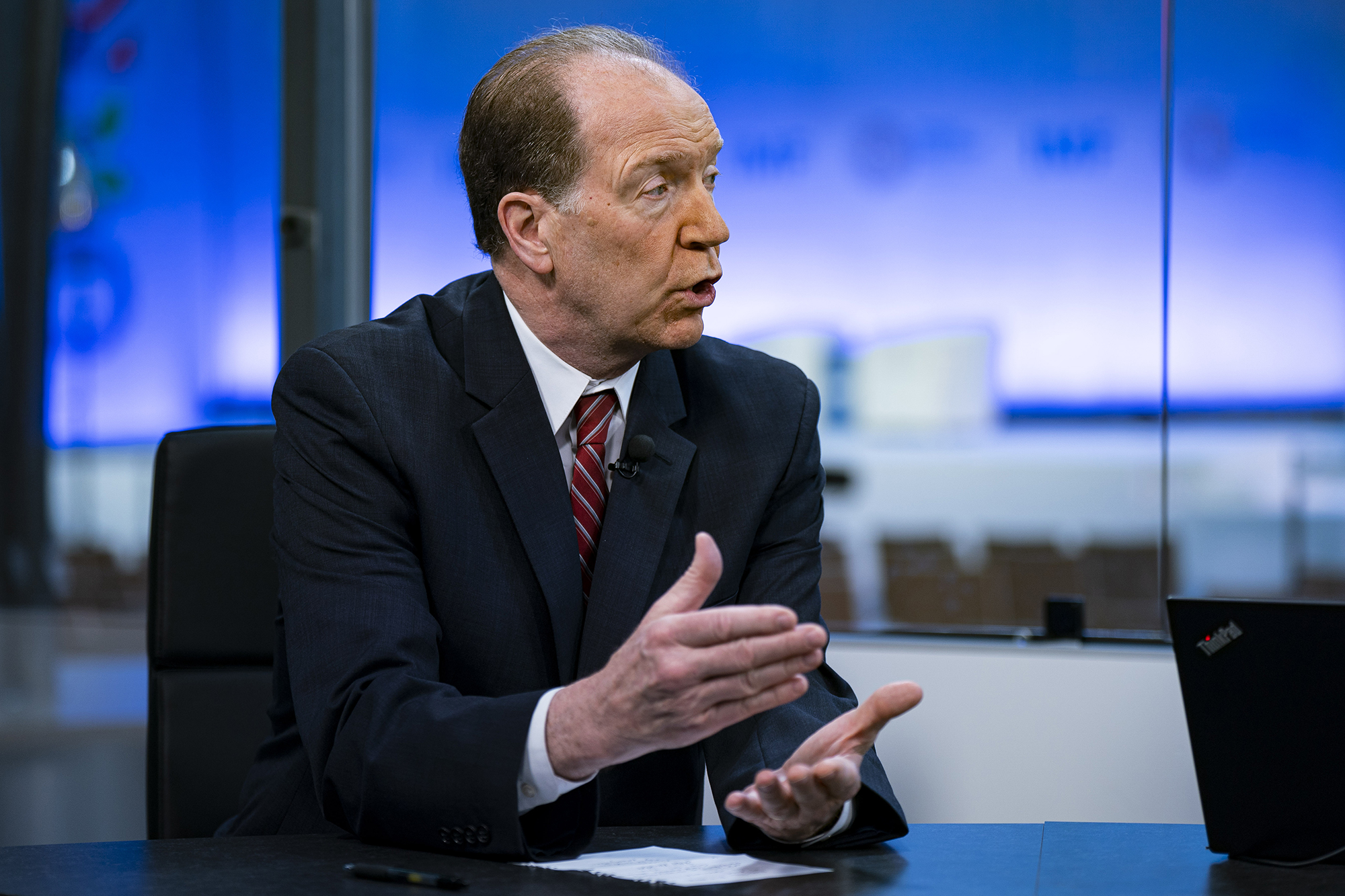 World Bank President David Malpass speaks during an interview on April 13, in Washington, DC. (Al Drago/Bloomberg/Getty Images)
World Bank President David Malpass speaks during an interview on April 13, in Washington, DC. (Al Drago/Bloomberg/Getty Images)Critics have lambasted the World Bank and, particularly, the International Monetary Fund, for predicting Russia's economy would hold relatively stable this year despite international sanctions.
But sanctions are hurting Russia's economy, even if World Bank forecasts don’t reflect it, according to the outgoing World Bank President David Malpass. Speaking to Julia Chatterley at the IMF-World Bank spring conference, David Malpass responded to criticism that you couldn’t trust GDP and economic data from Russia. He admitted “the quality of the data differs substantially by country…the reality is there’s not very much in terms of double checking of data”.
In January, the IMF projected that Russia’s economy would expand by 0.3% this year and 2.1% the next. That was much more optimistic than the latest forecasts from the World Bank, which still penciled in a contraction of just 3.3% this year. The Organization for Economic Cooperation and Development was the most pessimistic, forecasting a 5.6% contraction in Russia's economy in 2023.
Malpass said that GDP numbers were not capturing the “reality” and “horror” of the war, and noted the Russian economy was suffering.
“I think life is hard in Russia…they’re excluded from travelling to many parts of the world, their supply chains have to change dramatically… young people moving out because they don’t want to be part of this war," Malpass said.
Consumer sentiment largely unaffected by last month's banking stress, survey shows
From CNN's Bryan Mena
Consumer sentiment tracked by the University of Michigan held steady in April, according to a preliminary reading released Friday.
So far, the university's monthly surveys have shown a limited impact from the banking crisis on consumers' attitudes, but Americans remain concerned about an upcoming recession and some lingering fears about inflation persist.
"Consumers are expecting a downturn, they're not feeling as dismal as they were last summer, but they're waiting for the other shoe to drop," said Joanne Hsu, director of the surveys of consumers at the University of Michigan, in an interview with Bloomberg TV on Friday morning.
"We now have about a month of data following the collapse of SVB, and there hasn't really been much of an effect on sentiment at all," she said.
The latest survey also showed that higher gas prices helped push up year-ahead inflation expectations by a full percentage point, rising from 3.6% in March to 4.6% in April.
"Consumers are still feeling the pain of high prices," Hsu told Bloomberg, noting that survey respondents were now mentioning gas prices for the first time since fall.
Fed's Goolsbee: Inflation, retail sales data positive but keeping close eye on credit
From CNN's Alicia Wallace
The latest cooldown in consumer and producer price hikes as well as the latest decline in retail sales are indications that the Federal Reserve's efforts are working to bring down high inflation, Chicago Fed President Austan Goolsbee told CNBC on Friday.
"You don’t want to overreact to short-run news, but it feel likes like that's moving in the right direction," he said during an appearance on CNBC's "Squawk Box."
Goolsbee was quick to note that an area of critical importance to him in advance of the next Fed meeting is activity in banking and credit.
Earlier this week, Goolsbee noted that the Fed needs to be "on watch" for tighter credit conditions as a result of the banking turmoil last month. He referenced private sector analyst estimates that the spillover effects of the crisis equate to the Fed enacting rate hikes anywhere from a quarter point to three-quarters of a point.
"I'm an old-school data dog," Goolsbee said Friday. "What I would do is spend the next three weeks getting out and figuring out how much credit tightening is coming."
Big bank CEOs address the banking meltdown
Chief executives at some of the largest banks in the United States were forced to address the elephant in the room as they reported first-quarter earnings on Friday morning: The regional banking crisis that brought Silicon Valley Bank and Signature Bank to ruin last month.
> Banking industry turmoil has added to risks of recessionary "storm clouds" on the horizon, said JPMorgan Chase CEO Jamie Dimon Friday in a release. He added that "the banking situation is distinct from 2008 as it has involved far fewer financial players and fewer issues that need to be resolved."
Still, said Dimon, who leads the country's largest bank, "financial conditions will likely tighten as lenders become more conservative, and we do not know if this will slow consumer spending."
>“We are glad to have been in a strong position to help support the US financial system during the recent events that impacted the banking industry," commented Wells Fargo CEO Charlie Scharf in a statement. "Regional and community banks are an important part of our financial system and are uniquely positioned to serve their customers and communities."
> "I believe today’s crisis of confidence in the regional banking sector will further accelerate capital markets growth, and BlackRock will be a central player," wrote BlackRock CEO Larry Fink on Friday.
"Increased financing through the capital markets will require the scale, multi-asset capabilities and excellence in portfolio construction that BlackRock consistently delivers across market cycles," he said in a statement.
That means bad news for regional banks could be good news for BlackRock -- the lack of trust in regional banks will drive more investment into capital markets and BlackRock is poised to benefit as that happens.
"Throughout our history, moments of market dislocation and disruption have served as inflection points for BlackRock," he explained.
Regulators also hired BlackRock in early April to help the US government in the sale of the $114 billion in assets it collected from the collapse> Citigroup and PNC did not address the banking crisis in their releases, but will likely answer questions about how they've weathered the turmoil and what they see ahead at their first-quarter presentations, planned for 11 a.m. ET.
Dimon: Brace for the possibility that interest rates will remain higher for longer
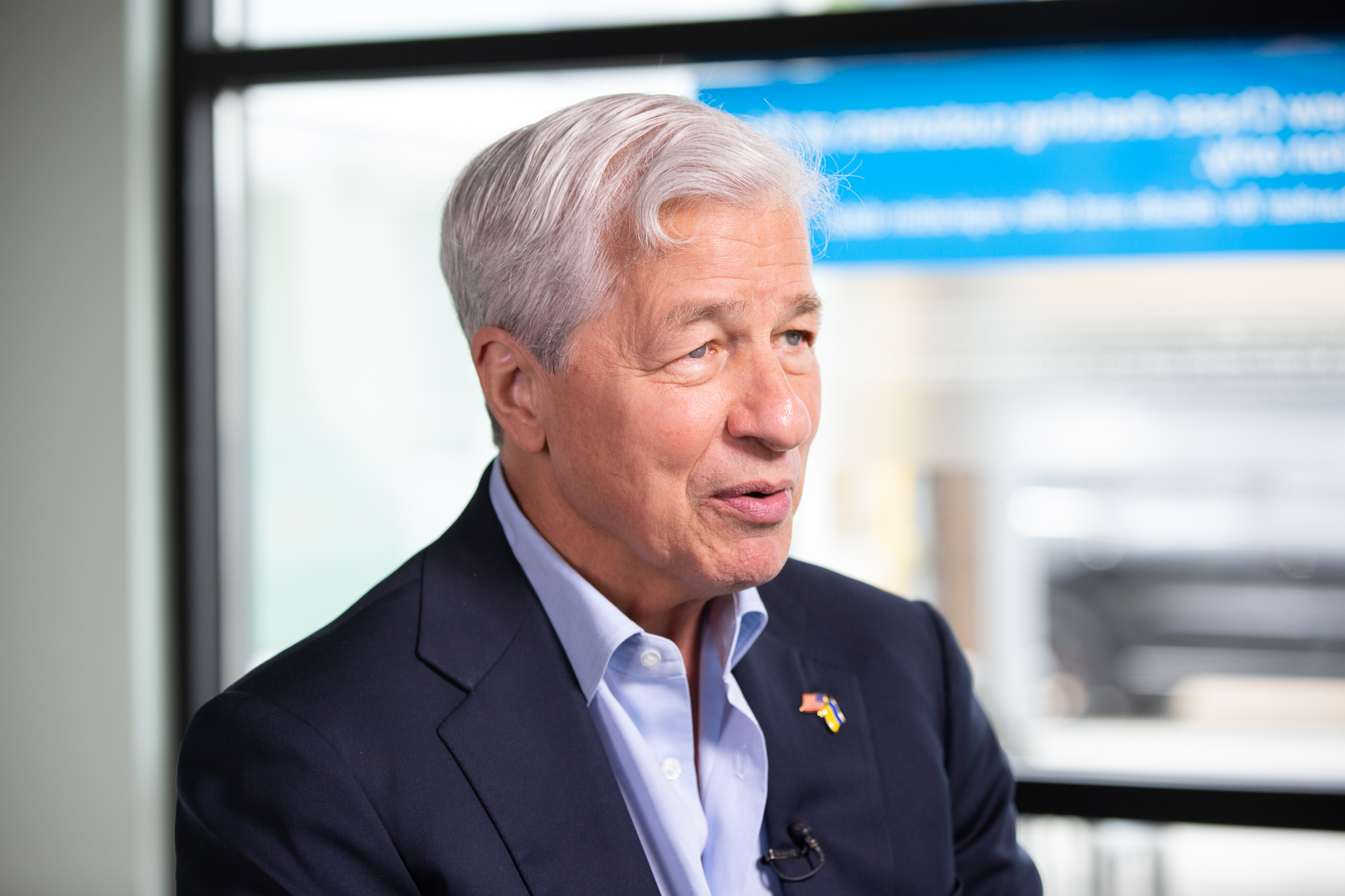 JPMorgan Chase CEO Jamie Dimon speaks during an interview with CNN on April 6, in Atlanta, Georgia. (Austin Steele/CNN)
JPMorgan Chase CEO Jamie Dimon speaks during an interview with CNN on April 6, in Atlanta, Georgia. (Austin Steele/CNN)JPMorgan Chase CEO Jamie Dimon warned investors Friday not to be caught unawares if interest rates stay higher longer than expected.
"People need to be prepared. They shouldn't pray that they don't go up. They should prepare for them going up. And if it doesn't happen, serendipity," Dimon said on the company's post-earnings conference call.
High interest rates have helped big banks, including JPMorgan Chase, since they widen the gap between the interest paid to customers and what they earn from investing that money. But climbing rates also helped drive last month's collapse of Silicon Valley Bank, which held 55% of its customers deposits in long-dated bonds whose value diminished as interest rates rose.
Dimon stated that he believes the banking crisis will pass — even though he expects its effects to reverberate through the sector for years to come — but that the possibility of higher interest rates should remain on companies' radars.
"If and when that happens, it will address problems in the economy. For those who are too exposed to floating rates, or those who are too exposed to [refinancing] risk, those exposures will be in multiple parts of the economy," Dimon said.
"Now would be the time to fix it. Do not put yourself in a position where that risk is excessive for your company, your business, your investment pools," he said.







.png)



 English (US)
English (US)